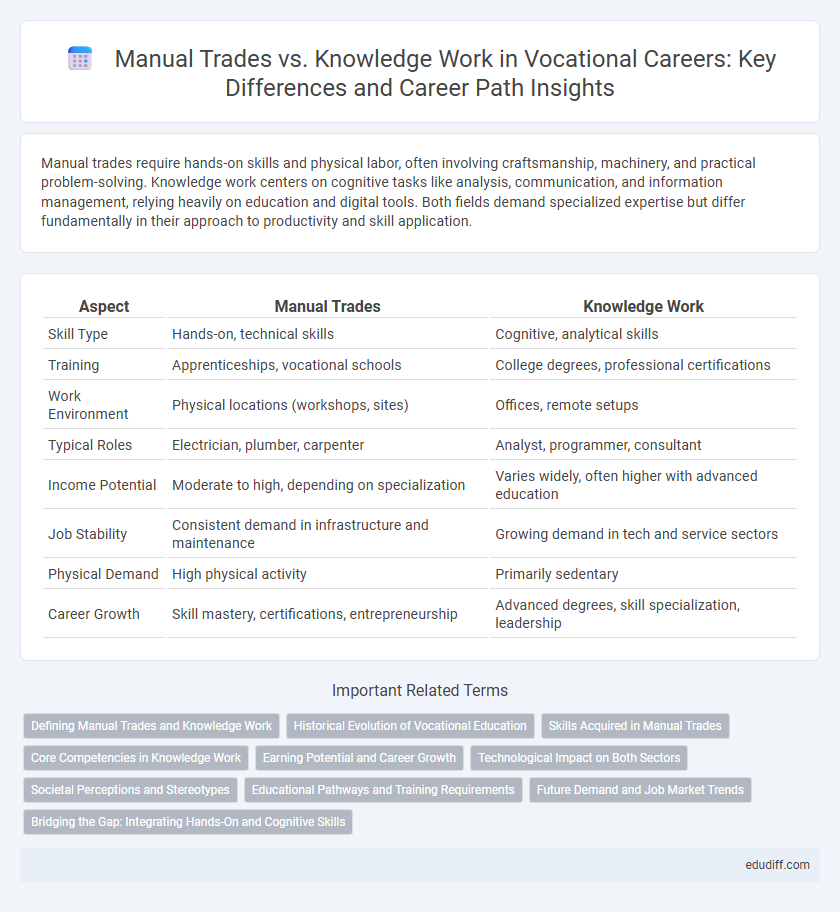Manual trades require hands-on skills and physical labor, often involving craftsmanship, machinery, and practical problem-solving. Knowledge work centers on cognitive tasks like analysis, communication, and information management, relying heavily on education and digital tools. Both fields demand specialized expertise but differ fundamentally in their approach to productivity and skill application.
Table of Comparison
| Aspect | Manual Trades | Knowledge Work |
|---|---|---|
| Skill Type | Hands-on, technical skills | Cognitive, analytical skills |
| Training | Apprenticeships, vocational schools | College degrees, professional certifications |
| Work Environment | Physical locations (workshops, sites) | Offices, remote setups |
| Typical Roles | Electrician, plumber, carpenter | Analyst, programmer, consultant |
| Income Potential | Moderate to high, depending on specialization | Varies widely, often higher with advanced education |
| Job Stability | Consistent demand in infrastructure and maintenance | Growing demand in tech and service sectors |
| Physical Demand | High physical activity | Primarily sedentary |
| Career Growth | Skill mastery, certifications, entrepreneurship | Advanced degrees, skill specialization, leadership |
Defining Manual Trades and Knowledge Work
Manual trades involve hands-on skills and physical labor in industries such as construction, plumbing, electrical work, and manufacturing, requiring specialized training and craftsmanship. Knowledge work centers on cognitive tasks including analysis, problem-solving, and decision-making in fields like information technology, finance, and education, relying heavily on intellectual expertise and digital proficiency. Both sectors demand distinct skill sets, with manual trades emphasizing practical experience and knowledge work prioritizing mental acuity and continuous learning.
Historical Evolution of Vocational Education
Vocational education has historically transitioned from an emphasis on manual trades, such as carpentry and blacksmithing, to incorporating knowledge work like information technology and engineering. This evolution reflects industrial advancements and the increasing demand for technical expertise in the global economy. Training programs now blend hands-on skills with theoretical knowledge to prepare workers for complex, technology-driven roles.
Skills Acquired in Manual Trades
Manual trades cultivate practical skills such as precise hand-eye coordination, mechanical aptitude, and problem-solving in physical environments, essential for carpentry, plumbing, and electrical work. These trades emphasize mastery of tools, materials, and safety protocols, fostering hands-on expertise that directly translates into industry-specific competencies. The acquired skills often include spatial reasoning, manual dexterity, and the ability to interpret technical blueprints and schematics, making manual trades highly valuable in construction, manufacturing, and maintenance sectors.
Core Competencies in Knowledge Work
Core competencies in knowledge work emphasize analytical thinking, problem-solving, and effective communication skills pivotal for managing information and making data-driven decisions. Mastery of digital tools, continuous learning, and adaptability to evolving technologies further enhance proficiency in knowledge-centric roles. These competencies enable professionals to innovate, collaborate cross-functionally, and contribute strategically within dynamic business environments.
Earning Potential and Career Growth
Manual trades such as plumbing, electrical work, and carpentry offer competitive earning potential with steady demand and opportunities for apprenticeships leading to journeyman and master status, often resulting in high salaries without the need for extensive formal education. Knowledge work fields, including IT, finance, and engineering, provide substantial career growth through advanced degrees and specialized skills, frequently yielding higher initial incomes and positions in management or expert roles. Both paths demonstrate strong career trajectories, but manual trades emphasize hands-on expertise and skill-based wages, while knowledge work focuses on intellectual capital and continuous professional development.
Technological Impact on Both Sectors
Technological advancements have transformed manual trades through automation, robotics, and advanced machinery, increasing efficiency and precision while reducing physical labor demands. Knowledge work benefits from digital tools, artificial intelligence, and data analytics, enhancing decision-making, collaboration, and productivity. Both sectors experience shifts in skill requirements, emphasizing continuous learning and technological adaptability to stay competitive in evolving industries.
Societal Perceptions and Stereotypes
Manual trades often face societal stereotypes labeling them as less prestigious or intellectually demanding compared to knowledge work, which is frequently associated with higher social status and cognitive skill. These perceptions influence career choices and educational paths, despite the critical economic and practical value of skilled trades such as plumbing, electrical work, and carpentry. Challenging these stereotypes requires highlighting the complexity, expertise, and essential societal contributions of manual trades alongside the innovation and problem-solving central to knowledge work.
Educational Pathways and Training Requirements
Manual trades typically require hands-on apprenticeships, technical certifications, and vocational school training focused on practical skills development. Knowledge work demands formal higher education, such as college degrees, coupled with ongoing professional development to master specialized theoretical knowledge. Both pathways emphasize skill acquisition but differ significantly in educational settings and credentialing processes.
Future Demand and Job Market Trends
Future demand in vocational fields shows a growing need for skilled workers in manual trades such as electricians, plumbers, and welders, driven by infrastructure development and maintenance. Knowledge work jobs, including software development, data analysis, and digital marketing, continue expanding rapidly due to technological advancements and business digitization. Job market trends indicate a hybrid approach, valuing cross-disciplinary skills that combine manual expertise with digital literacy to meet evolving industry requirements.
Bridging the Gap: Integrating Hands-On and Cognitive Skills
Bridging the gap between manual trades and knowledge work enhances workforce versatility by combining hands-on expertise with critical thinking and digital literacy. Integrating practical skills with advanced technology in sectors like manufacturing and construction boosts productivity and innovation, fostering resilient career pathways. Training programs that emphasize both cognitive and manual competencies prepare workers for evolving job demands, ensuring adaptability in dynamic labor markets.
Manual Trades vs Knowledge Work Infographic

 edudiff.com
edudiff.com